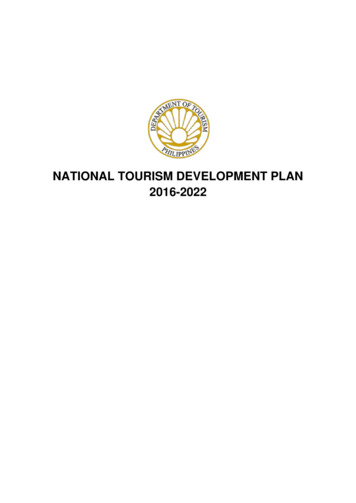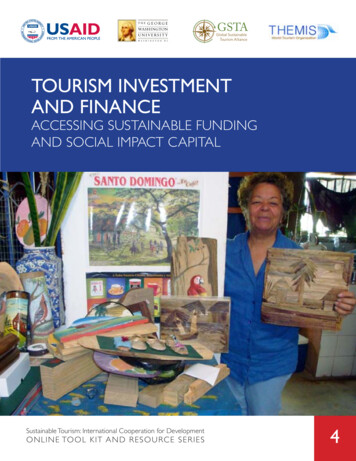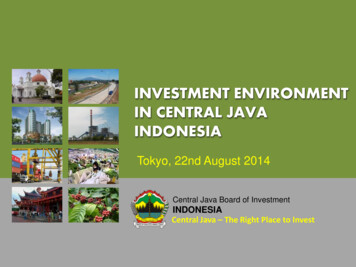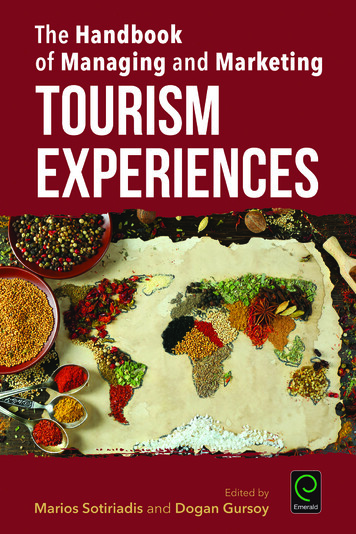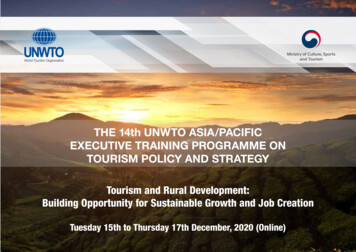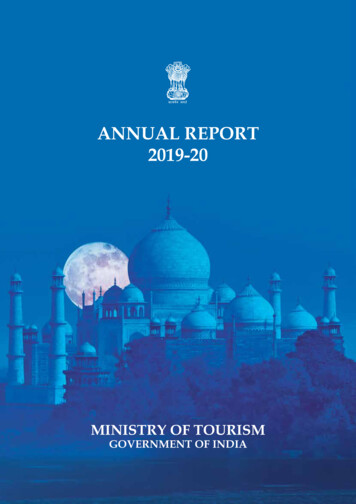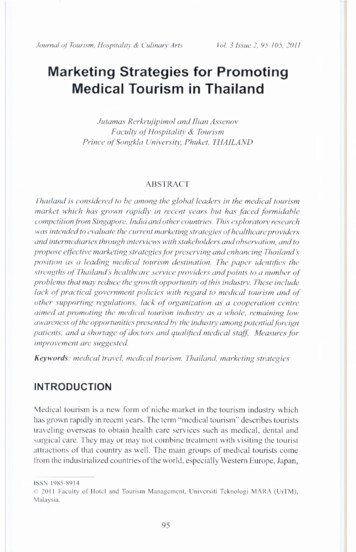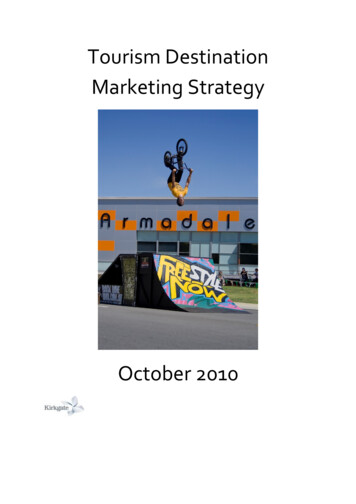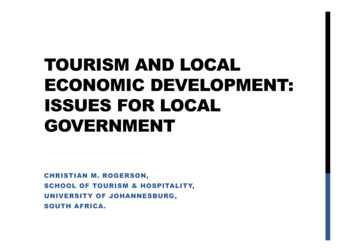
Transcription
TOURISM AND LOCALECONOMIC DEVELOPMENT:ISSUES FOR LOCALGOVERNMENTCHRISTIAN M. ROGERSON,SCHOOL OF TOURISM & HOSPITALITY,UNIVERSITY OF JOHANNESBURG,SOUTH AFRICA.
INTRODUCTION Local economic development is one of the core functionsof local government in South Africa Support for local development comes from a range ofgovernment departments, including dti, DCOG, and NDT. Traditionally LED in South Africa has been focussed aroundincreasing PRODUCTION in localities ie expansion ofproduction of industry, agriculture, mining etc. One alternative driver for local economic development istourism
INTRODUCTION (2) Tourism planning is about creating localities as centres forCONSUMPTION This presentation seeks to highlight issues for localgovernment in planning tourism as a lead sector or driverfor LED in South Africa.
KEY ARGUMENTS Successful tourism spaces emerge out of variouscircumstances Successful tourism-led development requires certain preconditions in terms of having certain assets for tourismdevelopment. From international experience of successful tourism-leddevelopment ten principles can be identified for SouthAfrican local governments to inform planning for tourism.
SUCCESSFULTOURISM LOCALITIES* Localities can emerge as successful tourism spaces foressentially three reasons First, many localities, such as beach resorts or spas, are‘discovered’ by private sector entrepreneurs or developerswho identify in these places, certain opportunities fordevelopment, triggering the growth of accommodationand recreational facilities, tourist attractions or conferencecentres. Second, other localities become tourism spaces as aresult of local initiatives which sometimes are driven outof necessity for new economic opportunities.
SUCCESSFULTOURISM LOCALITIES* Examples would be the growth of urban tourism or tourismroutes Finally, other localities emerge as tourism spaces bydefault as particularly in developed countries certainlocalities have become tourism spaces, if not against thewill of the local inhabitants then at least often without theirdirect encouragement, as a result of much enhancedlevels of personal mobility. For example, many coastal and rural areas, mountain andwilderness spaces, have become tourism spaces bydefault often because of improved levels of mobility and ofan increased search by people for new experiences inplaces previously untouched by tourism
PRECONDITIONS FORSUCCESS* For a locality to be successful in terms of tourism as a driver fordevelopment, certain preconditions need to be met.* Tourism asset base - there is a fundamental requirement for localities todevelop a total tourism product or portfolio of products which will attractvisitors.* The competitive position of any tourism destination is determined to asignificant extent by the diversity and quality of its resources and services.In particular, considerable emphasis is given to the importance of QUALITYOF ASSETS as a factor in impacting upon the competitiveness of tourismspaces.*Assets can be natural beauty (mountain, beach), heritage resources, uniquewildlife etc and socio-cultural resources (including festivals, sports events).*Overall, the attractiveness of particular tourism spaces arises from its blendof resources and services. Davidson and Maitland (1997, p. 23) observe:“Without such a mix, a place will not work as a destination”.
PRECONDITIONS FORSUCCESS A second critical precondition for success is appropriateand effective planning and management of tourism atdestinations. The need for visitor management planning arises from thefact that whilst the private sector driven tourism industrymay be successful at attracting visitors to destinations, itis often less successful at protecting destinations fromthe negative effects of tourism development. The visitormanagement planning process is concerned with how toaccommodate visitors whilst minimizing the adverseimpacts that they may cause. International experience points to the need for localpartnerships between local authority and private sectorand development of local tourism plans.
TEN KEY PRINCIPLES FORSUCCESSFUL TOURISM-LEDLOCAL ECONOMICDEVELOPMENT From the existing international experience in bothdeveloped and developing countries a series of keylessons can be extracted that can be useful for SouthAfrican policy makers 10 key principles are presented here for achievingsuccessful tourism-led local economic development. These can be viewed as ‘good practice’ for localgovernment and tourism planning
PRINCIPLES FOR SUCCESSTHEME 1: BE REALISTIC*There is a need for realism by policy-makers as to whether tourismis a viable option for particular localities, whether in urban or ruralareas. Unless the locality has an adequate total tourism product orportfolio of products, tourism-led LED is not a viable option. Areas that would not have the basic requirements for tourismwould be those which are in combination (a) intrinsicallyphysically unattractive, (b) lack infrastructure, (c) not perceivedas safe or secure; and/or (d) inaccessible by road or rail (andincreasingly air).
PRINCIPLES FOR SUCCESSTHEME 2: DO NOT DIVORCE ECONOMIC DEVELOPMENT FROMSOCIAL DEVELOPMENT AND THE ENVIRONMENT* Economic development cannot be divorced from environmental,and particularly social development. As well as job creation, enterprise development andenvironmental management, there is a need for stablecommunities, a well trained and educated workforce, safeenvironments and a healthy population. Tourism cannot create these social benefits but it cannot survivelong without them – initiatives by local government are crucial.
PRINCIPLES FORSUCCESSTHEME 3: LINK TOURISM DEVELOPMENT TO PRO-POORINITIATIVES* Successful LED means bringing tangible benefits to poorcommunities. In developing economies, therefore, LED must be firmlylinked to a commitment to pro-poor tourism policies. Pro-poor interventions in LED strategies must seek toenhance opportunities and expand the impact of tourismwidely in local communities. In addition, tourism taxes or spin-offs might be used toimprove local schools, health facilities or communitydevelopment projects.
PRINCIPLES FORSUCCESSTHEME 4: DO NOT PLAN TOURISM IN ISOLATION – CREATESYNERGIES WITH OTHER SECTORS It must be acknowledged that tourism does not exist inisolation of other economic activities. In planning a holistic approach is required in LEDprogramming which recognises the linkages betweentourism and other economic activities, seeks synergiesand complementarities. Linking tourism and local agriculture to support localsourcing
PRINCIPLES FORSUCCESSTHEME 5: PLANNING SHOULD TRY AND AVOID TOURISTENCLAVES OR GHETTOS Attempts in local planning should be made to avoid theghettoisation of tourism in destination regions. Tourists should be encouraged to venture away from the‘tourist oases’ and instead participate in a richer learningexperience in destination areas. Encourage tourists to meet local people, take part ineveryday local events or even to visit local work places. Encourage a geographic spread of tourism withindestinations
PRINCIPLES FORSUCCESSTHEME 6: PLAN OPPORTUNITIES FOR TOURISMDEVELOPMENTS LED BY SMALL BUSINESSES AS WELLAS LARGE ENTERPRISES* Large tourism investors must be welcomed But there is a strong case for seeking to move away fromlarge-scale and prestige projects and instead focus uponsmaller scale projects, which growing organically overtime and under local managerial control, where possible. Smaller tourism projects potentially might offer greateropportunities for local enterprise and especially for SMMEdevelopment.
PRINCIPLES FORSUCCESSTHEME 7: DO NOT JUST PLAN FOR GROWTH IN VISITORNUMBERS – INSTEAD PLAN TO MAXIMISE LOCALIMPACTS Local networks and networking should be encouraged asfar as possible in order to ensure that the requirements ofthe tourism industry are maximised for local suppliers,reducing leakages from the local economy. Build and support local supply chains to tourismestablishments especially accommodation establishments
PRINCIPLES FORSUCCESSTHEME 8: ESTABLISH RESEARCH AND MONITORINGSYSTEMS For successful tourism development local governmentsmust establish data systems and monitoring ofperformance of local tourism economies. Constant and objective monitoring and performanceindicators need to be put in place.
PRINCIPLES FORSUCCESSTHEME 9: COMMUNITY PARTICIPATION IS IMPORTANT BUTBE REALISTIC Community participation within and support for a tourismled local economic development initiative must bemaximised. Nevertheless, in developing countries, the limits ofcommunity participation also need to be recognised. It is naïve to assume that a participatory tourismdevelopment approach will alter the existing structure ofthe tourism industry without changing the dominantsocio-economic and political structure of a locality.
PRINCIPLES FORSUCCESSTHEME 10: GOOD GOVERNANCE Tourism-led development cannot succeed in anenvironment of inefficient local government, corruption,over-regulation etc. There is a critical need for good governance, cooperationand institutional thickness in order for the effectiveimplementation of tourism-led LED.
CONCLUSION The challenge of developmental local government and thepromotion of LED is one that must be mainstreamed in theactivities of South African local government. The international record shows that tourism can be acritical driver for local economic development for some(but not all) localities. In terms of achieving successful tourism-led localdevelopment 10 principles for success and lessons forlocal government have been identified
CONCLUSION (2) Realism is needed as to viability of tourism to be a leadsector. Plan tourism-led economic development together withachieving social development and environmentalmanagement. Maximise pro-poor impacts through searching for propoor tourism opportunities Do not plan tourism in isolation – create synergies withother economic activities. Try to avoid tourism enclaves in destinations byencouraging local geographical spread of touristswherever possible.
CONCLUSION (3) Large investments are welcome but keep the welcome matin place for tourism development led by small enterprises. Maximise local supply chains to key tourism products Establish local research and monitoring systems Maximise within its limits the opportunities for communityparticipation. Local governments must take responsibility for goodgovernance in order to achieve and maximise possibilitiesfor tourism-led local economic development.
INTRODUCTION Local economic development is one of the core functions of local government in South Africa Support for local development comes from a range of government departments, including dti, DCOG, and NDT. Traditionally LED in South Africa has been focussed around increasing PRODUCTION in localities ie expansion of
